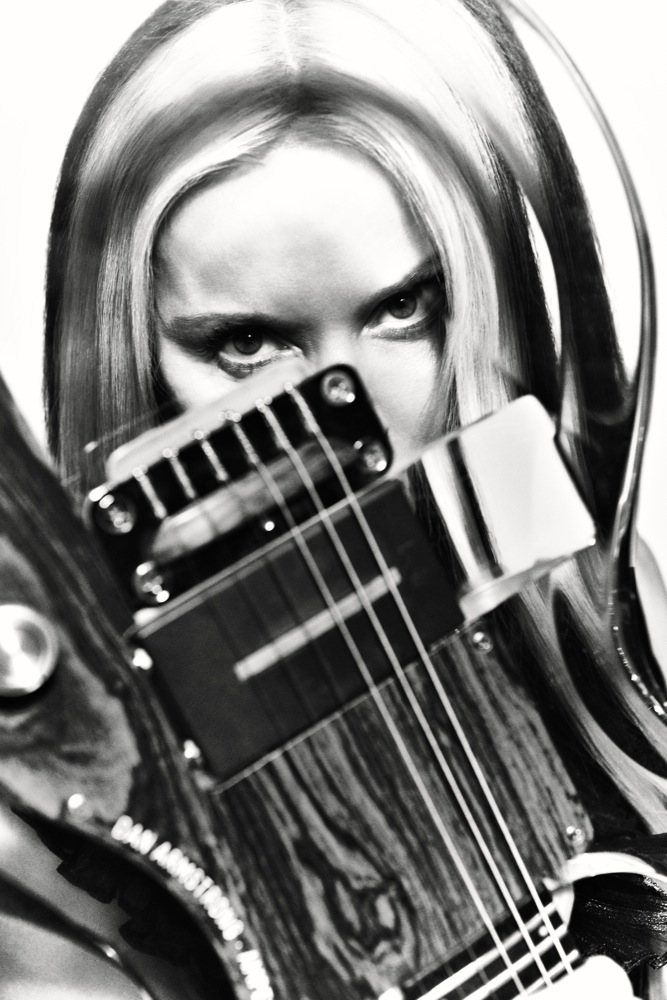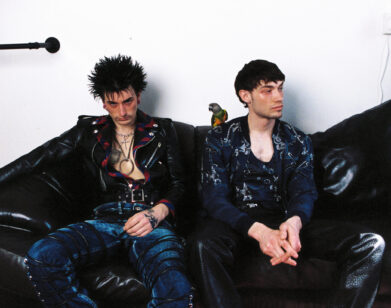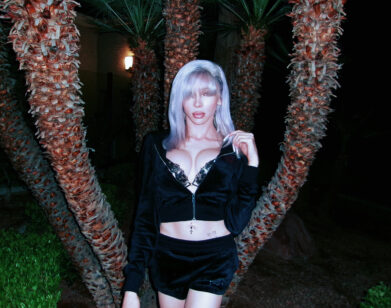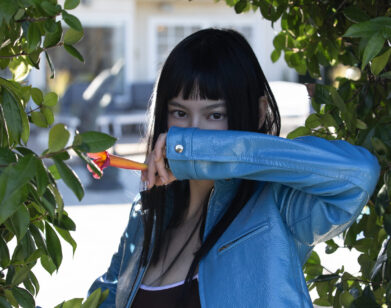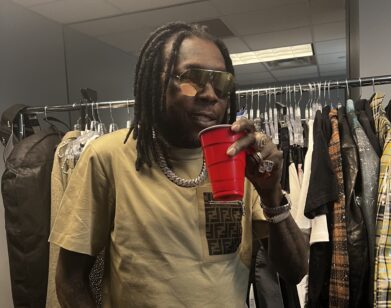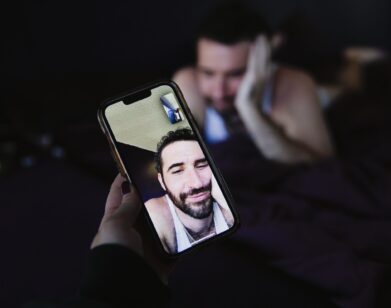The Dark Optimism of Daphne Guinness
DAPHNE GUINNESS IN NEW YORK, MARCH 2016. PHOTOS: STAS MAY. STYLING: MARY FELLOWES. HAIR: ADAM MARKARIAN. MAKEUP: JUSTINE PURDUE AT TIM HOWARD MANAGEMENT USING TOM FORD BEAUTY. MANICURE: YUKIE MIYAKAWA AT KATE RYAN INC. FOR DIOR VERNIS.
Model, muse, couture collector, and cultural icon, Daphne Guinness has assumed many roles throughout her life. Until recently, however, the English-Irish heiress had never pursued the field in which she actually trained: music. At age 19, Guinness was accepted to the prestigious Guildhall School in the U.K., but she did not atttend and abandoned the dream until 2011, when her brother Jasper passed away. Following his death, the now 48-year-old retreated into a studio in Ireland, intending only to record a Bob Dylan cover, but soon emerged with more than an album’s worth of original songs. Armed with her collection of newly recorded demos, Guinness sent a blind email to famed producer and frequent David Bowie collaborator Tony Visconti, who, listening to urges from mutual friends, decided to give the musical newcomer a chance. On Friday, two years after she began working with Visconti, Guinness released the fruits of their labor: her debut album, Optimist in Black.
Although the album is largely left open to listeners’ interpretations, traces of Guinness’ personal journey and traumas resonate throughout. The titular song, for example, was written during the period following the loss of two of her closest friends, Alexander McQueen and Isabella Blow. While the track reflects the bleakness of this period for the writer, it simultaneously achieves a dark, universal and emotional appeal. As a whole, with its occasional yelps and screams, Optimist in Black melds ’60s psych and ’70s glam rock, creating a complex 14-song exploration of everything from identity and alienation to peace and love. Just before the release, Guinness and Visconti caught up over the phone.
DAPHNE GUINNESS: Hey, Tony!
TONY VISCONTI: Daphne!
GUINNESS: You’re going to lead the conversation. You’re the real artist here.
VISCONTI: Well, how can we start? You and I hadn’t met before you sent me an email. Why did you send the email specifically to me?
GUINNESS: You’re the best producer in the world.
VISCONTI: Maybe I am, maybe I’m not. [laughs] I was told to give you a chance; I didn’t know you were a musician and singer, but when you played me your first three songs I nearly fell off my chair.
GUINNESS: I remember that day. I was so nervous. I actually went up and down the lift.
VISCONTI: Lyrically, your poetry is so rich and expressive. You were talking about real life experiences.
GUINNESS: I think we’re on the same page here. We are in the age of horrible auto-tuning, but I would not record something unless it’s real. Unless I could perform it live, I wouldn’t record it.
VISCONTI: Talking about the origins, it began about two years ago, and it took about a year on and off.
GUINNESS: I couldn’t let go. I hated the idea of a release, and then I was talking to other artist friends of mine and they said, “You can’t fear this sort of hall of mirrors, you can’t reflect these things back on yourself. You’ve got to respect everybody that is part of the journey.”
VISCONTI: You wanted to keep recording for forever. [laughs] You were having the time of your life!
GUINNESS: But also I didn’t want to release. [The songs] are like babies. When I listen to the album, I actually think, “This isn’t bad, I’m not bored,” and that’s really weird because mostly when I see stuff that I’ve done, I’m like, “Oh god, I don’t want to see it on the shelf.” This is a real labor of love.
VISCONTI: And then you went on to make that first video, “An Evening in Space,” with David LaChapelle. How many videos are there now?
GUINNESS: There are five. Do you know what I’m working on? Doing sound and vision un-divorced. The visual people don’t understand. The first day, I had no music so I was running the track in my head while doing all this stuff. You’re making a music video and not running the track? I was just winging it. The second day I managed to get some music, but David was the only person that actually understood music. I was so pleased when he said, “This is what that song is about,” because it’s not really about being in outer space. It’s about war or peace or love, and if people want to listen to something else, that’s fine. We’re all doing our best here.
VISCONTI: I’d like to get one question out of the way: Can you talk about the moment David Bowie appeared during the recording sessions? He was like a godfather to this record. He appeared briefly in two of the sessions. He didn’t participate; he just wanted to see how you and I were working. First, he came when we were doing backing tracks with a four-piece band, and stayed for about an hour and listened to a few things. Then he came when we were doing the 20-piece string orchestra. He showed up unannounced. I told him I’d be there that day, and he didn’t want to miss 20 strings playing in one room. But after that we never saw him again on our sessions. He was a very benign godfather.
GUINNESS: I got an email saying he wanted to see a cut from everything of what we’re doing. I said, “Are you kidding me? Of course.” I’m so sad, but he’s not gone. To have him as a godfather…
VISCONTI: That’s what it felt like. He was very keen on it. He loved your style of music, too. It was definitely from his time, when he started in his 20s, the concept of psychedelic pop. There were songs in the Top 10 that were talking about taking LSD and tuning in and dropping out. You can’t do that anymore, you know? [laughs]
GUINNESS: Well, we’re doing it.
VISCONTI: Yeah, of course, but I think that’s why he took a keen interest. The genre was something he loved and was very familiar with. I think the only word of advice he gave me was, “Daphne’s great, she should play live,” which you’re doing now.
GUINNESS: You’re going to be so blown away by the new set.
VISCONTI: The next one is personal, Daphne. Why did you feel like now was the right time to return to music?
GUINNESS: Because I had lots of tragedies in my life. I’d been writing poetry for a long time. I was going to do a cover of a Dylan song, but in Ireland, my best friend, who’s a hippie, didn’t get the email so he never turned up. That’s why I started writing songs. I guess it’s like they say everybody has a book in them, I had an album in me.
VISCONTI: You have several albums! It was something you’ve been holding back all your life. As a lyricist, you’re so witty and you use irony and metaphor well.
GUINNESS: I had to rewrite some of the lyrics because you don’t want to give away everything; people want to discover things. People like an adventure, like to discover hidden things, so I had to rewrite the whole thing. But god, it was fun. I think I did, like, 10,000 hours. I was such an amateur—am such an amateur.
VISCONTI: I’m still learning how to do my job, too. [laughs]
GUINNESS: Isn’t it great? If there is nothing left to discover, we’d all just lie in bed and eat chocolates.
VISCONTI: Daphne, can you tell me one of the biggest things you learned about yourself while making Optimist in Black? Or about one of the hardest struggles you faced while making the album?
GUINNESS: I don’t know how to answer that. Imagine a 747 suddenly going into a nosedive—the middle of the album was in that order. “Marionettes” and “Optimist [in Black],” I mean, I was about to slit my wrists. If it had gotten darker than “Optimist”—thank god I wrote “Magic Tea.” “Optimist” was a martyr dealing with my life. After that, it’s like the plane didn’t crash; it came back up.
VISCONTI: That’s a very dark track, lyrically. It was good to get that off your chest.
GUINNESS: But it’s not about me, thank god. I cut myself out of these songs enough. It’s not I feel like this; it’s all love, all war, all peace, because everybody is going through hassles and shit. It’s not about me and I’m not trying to make a point. People can take whatever they want out of this music.
VISCONTI: So you can’t really say this song is particularly about this, and that song is about that? Each song could be about a multitude of things?
GUINNESS: Of course. You cut yourself out in these things. I happen to be singing these songs, and yes, I’ve been through stuff, but we’ve all been through stuff. It’s not about us; it’s about the music. People will take from it what they want. They will reflect what they’re going through. I wouldn’t be writing music if I was trying to write prose. It would be different if I was writing a memoir. This is much more opaque.
VISCONTI: I think one song is very obvious to confer with you. “Joke” is about someone else.
GUINNESS: But he’s fine with it. I was running it by him and I said, “I could change that line,” and he said, “No. That’s the line. It rhymes. It’s art.” He didn’t go, “Oh my god.” I was so surprised that he didn’t mind that.
VISCONTI: But that confirms that you are a very remarkable observer. You’re not in [the song]. It’s all about that person, which is good, but I’d hate to be that person.
GUINNESS: So would I.
VISCONTI: You sliced that person up like a samurai.
GUINNESS: Never cross a songwriter. You know you’ll end up in a song. It’s the ultimate weapon.
VISCONTI: The only questions left are about Alexander McQueen and Isabella Blow. I don’t know how you want to address them.
GUINNESS: Listen to the record. Listen to the song. There were a lot of other people who committed suicide or died at the same time. It was a very, very dark period. But it’s going up; I’ve dealt with that. “Optimist,” thank god you put all the strings on it because I can sort of listen to it now, but I still cry. It’s a really heavy song. If you put your soul into things, you listen to it and realize that your life is in a song, but everyone will take what they want out of it. Let’s face it: We’re not doing this for anything but the love of music.
VISCONTI: That’s why it was so fun. We didn’t care if it was Top 10.
GUINNESS: Absolutely. We are at a very, very dirty point in music, and all we can do is make more music. I probably shouldn’t say this now, but my son had to go to a Justin Bieber concert—he’s writing an article about it—and he fell off the stage with the mic and the music carried on.
VISCONTI: The voice carried on. [laughs]
GUINNESS: Yes! If that happens, fine, you get back on the stage and pick up where you left off. I will never record a song that I can’t sing live.
VISCONTI: Today’s music is mainly rubbish.
GUINNESS: It’s homogenized shit. All we can do is fight with more music.
OPTIMIST IN BLACK IS OUT NOW. FOR MORE ON DAPHNE GUINNESS, VISIT HER WEBSITE.

